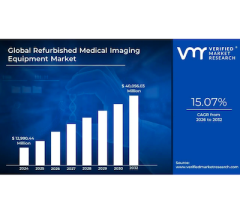
Image by whitfieldink from Pixabay
November 13, 2019 — Members of Congress from both sides of the aisle issued a series of oversight letters to the Centers for Medicare and Medicaid Services (CMS) in recent months to urge the Agency to adjust its proposed radiation oncology advanced alternative payment model (RO Model). CMS is expected to issue its final determination before the end of 2019.
Radiation oncology congressional champions Senators Richard Burr (R-N.C.) and Debbie Stabenow (D-Mich.) and Representatives Michael Burgess (R-Texas), Brian Higgins (D-N.Y.), George Holding (R-N.C.), Devin Nunes (R-Calif.), Mike Simpson (R-Idaho) and Paul Tonko (D-N.Y.) were among those who wrote to CMS Administrator Seema Verma to advocate that the RO Model be revised prior to it being finalized in order to protect cancer patients' access to life-saving radiation treatments. Their letters echo key areas of concern identified by physicians, patients and stakeholders from the radiation oncology community.
In their letters, congressional leaders focused on the scope, implementation and payment structure of the proposed RO Model. The letters specifically expressed concern about the mandate that requires a high percentage of radiation oncology practices to participate; the planned Jan. 1, 2020, start date; and that the proposed bundled payment rates fail to account properly for community-based clinic costs and curative treatments, as well as several other priorities. In addition, the letters highlighted the misalignment between significant "discount factor" payment cuts for participants without adequate incentive payments provided for under existing Medicare law.
Senators Burr (R-N.C.) and Stabenow (D-Mich.)
The Senate Finance Committee's longstanding supporters of radiation oncology wrote, "We believe that the current proposal does not fully balance the incentive to participate with the decrease in payment rate, potentially jeopardizing the availability of radiation therapy services for seniors." They added, "We urge CMS to address the above concerns to ensure that the model achieves what we all set out to accomplish – higher quality, more efficient, and effective care for patients." Read the letter from Sen. Burr and Sen. Stabenow here.
Representatives Burgess (R-Texas) and Nunes (R-Calif.)
The leading Republicans on the health subcommittees of the House Ways and Means and Energy and Commerce committees reminded CMS of the overall purpose of this effort. "The goal of improving payment stability and moving to value-based payment for radiation oncology began with a partnership among CMS, the radiation oncology community, and Congress. We urge you to continue to honor the spirit of this partnership by working in a transparent manner to address the concerns voiced by the radiation oncology community," they wrote. They also addressed required participation, noting "As a general principle and patient safeguard, we believe that the Center for Medicare and Medicaid Innovation (CMMI) should begin testing with a smaller scope. Similar to prior CMMI models, CMS should first allow for a period of voluntary participation in order to test the Model design." Read the letter from Rep. Burgess and Rep. Nunes here.
Representative Higgins (D-N.Y.)
Rep. Higgins also challenged the requirement that approximately 40% of practices participate in the model. "I ask that CMS consider making the model voluntary or allow for a phased-in approach to allow for any issues to be addressed before requiring such a large contingent of RO [radiation oncology] providers to participate." He also asked that "the magnitude and type of discounts, withholds, and adjustments to the model's payment calculation be reevaluated, as I am concerned that the reductions in payments that would result from the proposed methodology would be too severe for many RO practices to be required to bear." Read the letter from Rep. Higgins here.
Representative Holding (R-N.C.)
Rep. Holding questioned CMS on the direct payment cuts, or "discount factors," proposed to technical and professional payments. "A strong radiation oncology APM [alternative payment model] should employ a payment structure that balances incentives to providers with ensuring beneficiary access to the full array of radiation modalities. I encourage CMS to consider reductions to the professional and technical discount factors," he wrote. Read the letter from Rep. Holding here.
Representative Simpson (R-Idaho)
Rep. Simpson addressed concerns with the proposed model's mandatory participation and payment methodology. He also emphasized the contributions that radiation oncology innovation has made for patients with cancer, noting that the RO Model might chill investments in new technology and service lines that provide clinical benefit to patients. "I recommend that CMS make these essential reforms and others suggested by the radiation oncology community to better strike the appropriate balance between savings, access and quality. This includes ensuring that the model does not put financial or administrative burden on practices that are willing to take on risk under the model," he wrote. Read the letter from Rep. Simpson here.
Representative Tonko (D-N.Y.)
Rep. Tonko expressed concern that some aspects of the proposed RO Model will "undermine the goals of payment reform." He listed several specific issues CMS must address and added that "if CMS's proposed rule is finalized, radiation therapy services would face several unintended consequences that would jeopardize access to care." Read the letter from Rep. Tonko here.
"ASTRO thanks the many Senators and Representatives who wrote and called CMS with concerns about the model," said Theodore L. DeWeese, MD, FASTRO, Chair of the ASTRO Board of Directors. "The radiation oncology community appreciates Congress' strong interest in reforming the RO Model and is committed to working with policymakers to improve it for the benefit of cancer patients."
ASTRO believes that the RO Model, if improved, represents a step forward to allow the nation's 4,500 radiation oncologists to participate in the transition to value-based care that will incentivize higher quality radiation treatments for patients. However, in official comments submitted to CMS on Sept. 16, ASTRO expressed concerns that the proposal falls short of what's needed to achieve the promise of an alternative payment model for radiation oncology.
Specifically, an ASTRO analysis estimates that the RO Model would cut payments to required participants by approximately $320 million during the 5-year period — an excessive amount that would derail this unique opportunity. ASTRO recommended specific, significant changes to the proposal that would incentivize the use of high-quality, efficient radiation therapy treatments to drive value-based reform while still providing savings for Medicare.
ASTRO has worked with CMS and bipartisan legislators over the past several years to develop a viable payment model that would stabilize payments, drive adherence to nationally-recognized clinical guidelines and improve patient care. ASTRO believes that with significant modifications, the RO Model could represent a meaningful approach to enable the field of radiation oncology to participate in the evolving world of health care payment reform.
For more information: www.astro.org
Related content:
ASTRO Releases Comments on Proposed CMS Radiation Oncology Alternative Payment Model
VIDEO: Understanding the Radiation Oncology Alternative Payment Model


 February 17, 2026
February 17, 2026 









